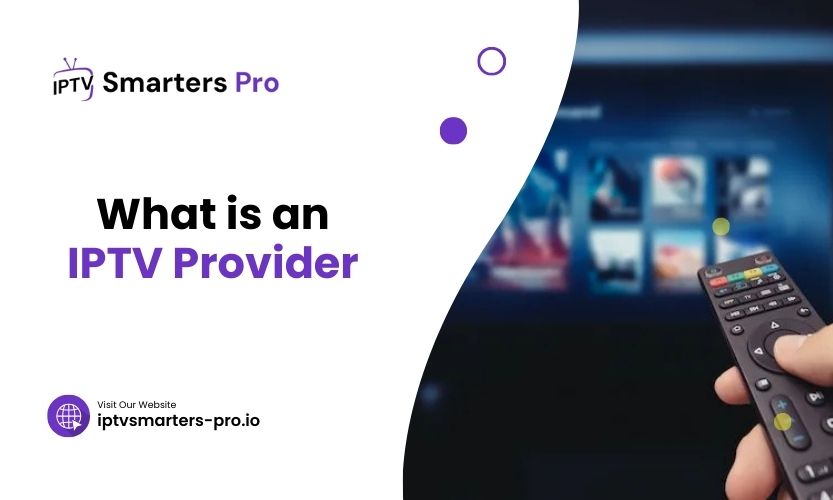Have you ever wondered how streaming platforms offer thousands of channels or on-demand movies without the need for cable? This is where IPTV providers come in. If you’re curious about how these services work and what makes them a game-changer in entertainment, you’ve come to the right place. This detailed blog will answer all your questions and give you a clear understanding of what an IPTV provider is, how it works, and why it might be worth considering.
What Is an IPTV Provider?
An IPTV provider is a service that delivers television content through the Internet instead of traditional cable or satellite formats. IPTV stands for Internet Protocol Television. This means that you can watch live TV channels, on-demand movies, series, or even recorded shows on devices like Smart TVs, phones, laptops, and tablets using an internet connection.
Instead of receiving signals via cable or satellite, IPTV relies on internet data packets to stream content. But is it legal? Is it reliable? What kinds of services can you expect? Let’s break it down step by step.
How Does an IPTV Provider Work?
The technology behind IPTV is simple but highly effective. It uses the internet to transmit television content to users. Here’s a simplified flow:
- Content Acquisition
IPTV providers acquire content from TV broadcasters, movie distributors, or other licensed platforms. They often have legal agreements to deliver this content to users. - Encoding and Compression
The acquired content is encoded and compressed into digital formats suitable for streaming. - Delivery via Internet Protocol (IP)
IPTV providers transmit digital content over the internet to your device using IP technology. - Access on Devices
Depending on the provider, users can watch content through a dedicated app, Smart TV software, or a streaming box.
Types of IPTV Services
IPTV providers generally offer three main types of services:
1. Live TV Streaming
This is the internet-based equivalent of traditional broadcast television. It includes real-time broadcasts of sports, news, and entertainment channels.
2. Video on Demand (VOD)
On-demand content allows you to watch movies or series whenever you like. You browse through a library, pick what interests you, and start streaming.
3. Time-Shifted TV
Have you missed an episode of your favorite show? Time-shifted TV lets you watch previously aired content within a specific time window, 24 or 48 hours after it airs.
Here’s a table summarizing these services:
| Service Type | Description | Example Content |
| Live TV Streaming | Real-time broadcasts of TV channels | News, Sports |
| Video on Demand | On-demand access to movies and series | Netflix-style content |
| Time-Shifted TV | Playback of previously aired shows within a window | Missed episodes, replays |
Benefits of Using an IPTV Provider
What makes IPTV providers popular? Here are some reasons people are shifting to these services:
- Convenience: Watch content on multiple devices anytime.
- Customization: Choose packages based on preferences like sports, movies, or kids’ channels.
- Cost-Effective: Cheaper than traditional cable subscriptions.
- High Quality: Many IPTV services support HD and 4K content.
For example, instead of paying for 500 cable channels you don’t watch, you can subscribe to an IPTV plan focusing only on what you enjoy.
Are IPTV Providers Legal?
A common question is about the legality of IPTV services. Legitimate IPTV providers operate under licensing agreements with content owners, ensuring that the content is distributed legally.
Illegal IPTV services, on the other hand, stream pirated content without proper rights. Always verify whether an IPTV provider is authorized and reputable to avoid legal trouble.
Popular Devices for IPTV Access
One of the best things about IPTV is its compatibility with various devices.
| Device Type | Examples |
| Smart TVs | Samsung, LG |
| Streaming Boxes | Amazon Fire Stick, Roku |
| Mobile Devices | iOS, and Android Phones |
| Computers | Windows, Mac |
Some IPTV providers also offer branded set-top boxes for a seamless experience.
How to Choose the Right IPTV Provider?
Not all IPTV providers are the same. Here’s how to pick one that suits your needs:
- Content Variety: Check if they offer channels or shows you’re interested in.
- Device Compatibility: Ensure the service works on your preferred devices.
- Streaming Quality: Look for HD or 4K options for the best viewing experience.
- Pricing Plans: Compare plans to find one that fits your budget.
- Customer Support: Reliable support can be a lifesaver if you face issues.
For example, if you’re a sports fan, ensure the provider includes sports channels in your package.
Challenges with IPTV Services
While IPTV providers offer great convenience, there are challenges to be aware of:
- Internet Dependency: Streaming can buffer or fail without a stable internet connection.
- Geographical Restrictions: Some services may not be available in certain regions.
- Security Risks: Unauthorized IPTV providers can expose you to malware or scams.
You can avoid most of these issues by choosing a reputable IPTV provider.
FAQs About IPTV Providers
- What is an IPTV provider?
An IPTV provider delivers television content online instead of cable or satellite. - Is IPTV better than cable TV?
IPTV is often more flexible and affordable, depending on your viewing habits and internet quality. - Can I use IPTV on any device?
Most IPTV providers are compatible with Smart TVs, phones, tablets, and streaming boxes. - Are all IPTV services legal?
Not all services are legal. Make sure the IPTV provider is licensed to avoid issues. - Do I need fast internet for IPTV?
A stable internet connection with at least 5 Mbps for HD or 25 Mbps for 4K is recommended.


